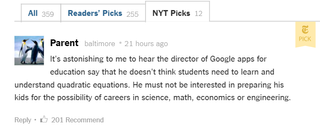A comment in The New York Times article How Google Took Over The Classroom struck a nerve for many readers. In it, Jonathan Rochelle, the director of Google’s education apps group seems to question the value of teaching all students quadratic equations and also the reluctance of some teachers to allow students to use Google when they want to learn something.
Here's the quote:

That resulted in a slew of angry comments like this one:

Here’s why those angry commenters (and those who gave such comments a recommendation) got it wrong:
First, the comment is too easily misinterpreted when taken out of context, as it was. Rochelle shared these Tweets to help make his view on the topic more clearly understood.
Context of my comment @nytimes:
UNDERSTANDING quadratic equation: awesome!
MEMORIZING it without learning when to use it: meaningless.
— Jonathan Rochelle (@jrochelle) May 13, 2017
Learning is UNDERSTANDING. Memorizing facts & formulas without understanding & knowing how to apply, is for test-takers not problem solvers pic.twitter.com/ICZaty6r1M
— Jonathan Rochelle (@jrochelle) May 14, 2017
In context, and with the clarifying Tweets, we can see Rochelle is not saying students don’t need to learn or understand quadratic equations. He is not saying he doesn’t understand what quadratic equations do. Nor is he saying what kind of career possibilities he is, or is not, interested in his kids being preparing for.
Instead, we see that what his comment addresses is that schools too often do a terrible job of making clear to students, and their parents, why they are learning what they are learning. This is evident when looking at the percentage of students who find school boring and irrelevant. They don’t see the value in what they are learning. Not familiar with those stats? You can start by reading this. Employers who are hiring these students agree that students learn in school does not prepare them for success in the workforce.
Rochelle’s points to an uncomfortable truth. Far too often, school teaches students without context and has not adjusted to the new role of the teacher in the age of Google. Students get this. Parents like Rochelle do too, but for the most part, schools are not hearing or understanding that the role of the school and teacher must change.
Student to teachers at #tltf13 "You don't need to teach us. That is what Google is for." #StuVoice#edchat
— Lisa Nielsen (@InnovativeEdu) October 18, 2013
In his book, Instant Relevance, Denis Sheeran puts it this way, “Students don't need teachers for information. Students have free access to information 24/7. What teachers can offer students, that digital options can not, is relevance. Unfortunately, as Rochelle points out, for the most part, schools are teaching siloed subjects out of context without connection or correlation to how what they are learning is applicable outside of school. Students are focused on memorization rather than true understanding.
The question we should be asking, which was not addressed in the New York Times article, is this: What should learning look like? Here are some ideas:
Rather than...
Help and empower students to...
Presenting facts and algorithms for students to memorize and asking them to practice rote recall and execution...
Discover relevant ways to use those algorithms which they can relate to.
“Teaching” disconnected facts and algorithms…
Determine and develop their passions, talents, interests and abilities.
Having students learn because they “might need it someday” or “it will be on the test”…
Do real world work and make real-world connections so that they can answer for themselves why they are learning something like quadratic equations.
Telling students they can’t Google something…
Use real world tools like Google. Then teach them how to critically evaluate the information they find.
Innovative educators know there are some school models that do this, but Rochelle’s insights point to the reality that such models need to be the rule, not the exception.
Lisa Nielsen writes for and speaks to audiences across the globe about learning innovatively and is frequently covered by local and national media for her views on “Passion (not data) Driven Learning,” "Thinking Outside the Ban" to harness the power of technology for learning, and using the power of social media to provide a voice to educators and students. Ms. Nielsen has worked for more than a decade in various capacities to support learning in real and innovative ways that will prepare students for success. In addition to her award-winning blog, The Innovative Educator, Ms. Nielsen’s writing is featured in places such as Huffington Post, Tech & Learning, ISTE Connects, ASCD Wholechild, MindShift, Leading & Learning, The Unplugged Mom, and is the author the book Teaching Generation Text.
Disclaimer: The information shared here is strictly that of the author and does not reflect the opinions or endorsement of her employer.

